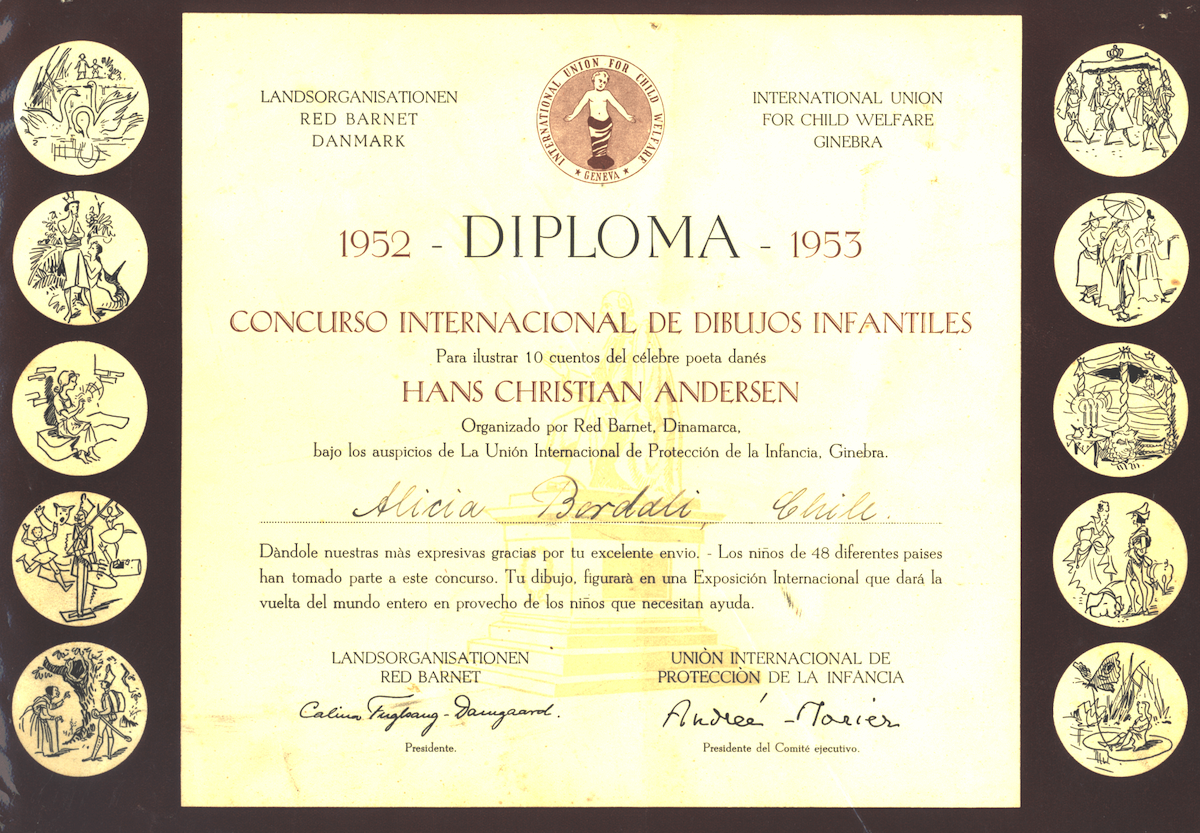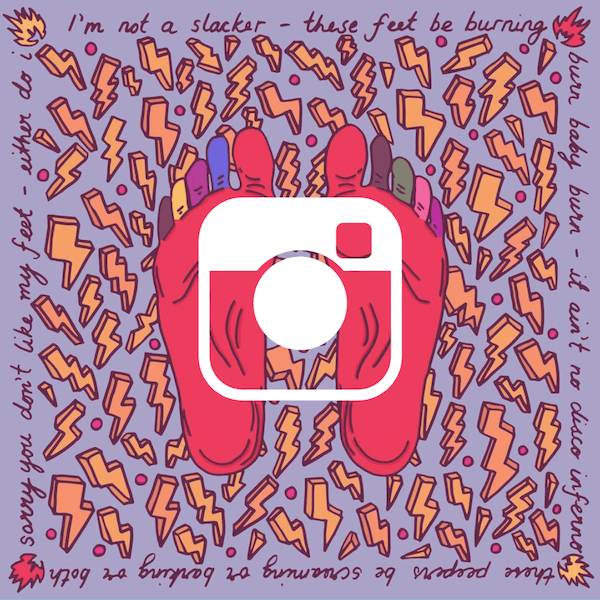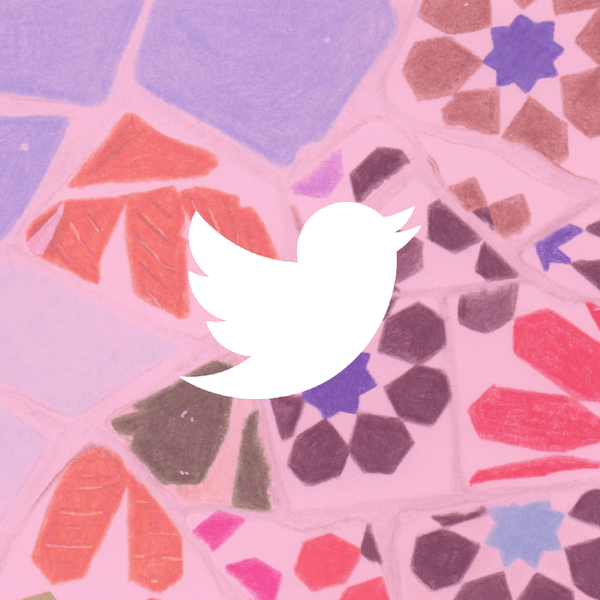words by cectimm
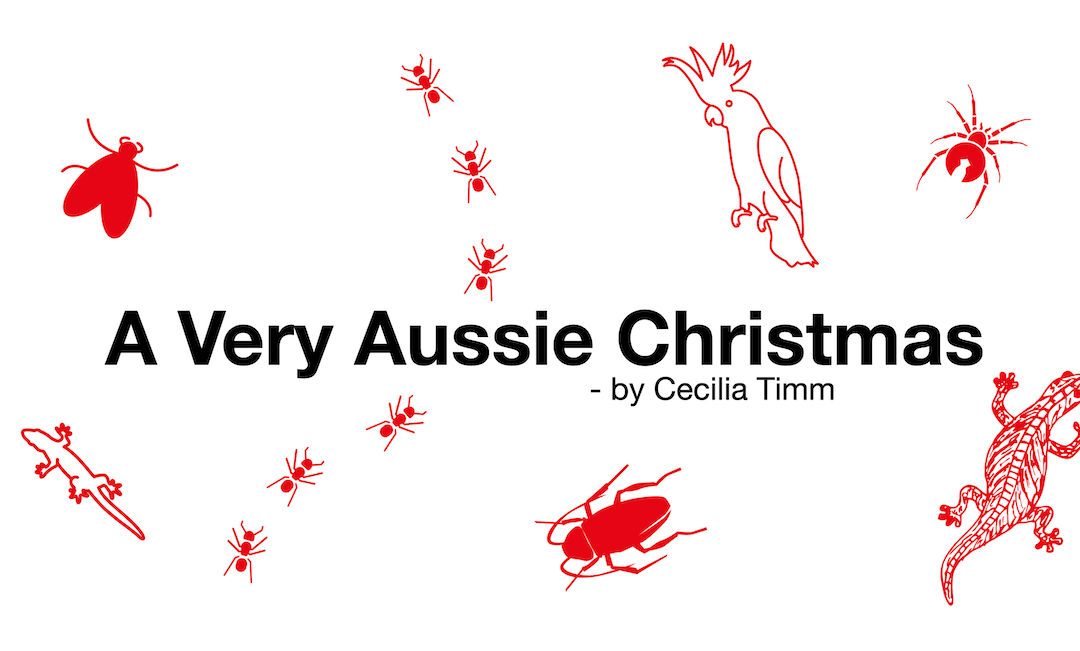
A Very Aussie Christmas
A Very Aussie Christmas
Twas the week before Christmas and all through the home,
the creatures were cawing; the insects would roam.
There are many different kinds some fly, crawl or jump along,
some are ignored, some saved, and some struck with a thong.
The ants start marching in orderly platoons,
the silverfish scatter in wardrobes and bathrooms.
The wasps fly around the fresh Christmas tree,
and the rainbow lorikeets scream, “Hey, look at me.”
The cockroaches confidently stroll right in the door,
the redbacks casually crawl across the floor.
The frogs croak and cry in the hot summer yard,
and the cockatoos sit on the fence keeping guard.
The lizards catch rays, lying in the hot summer sun,
and the centipedes are always on the run.
Daddy Longlegs chill out in corners on high,
and ladybugs cutely and casually strolled on by.
Huntsman dart quickly scaring you half to death,
and cicadas put on a show that rivals Macbeth.
Dragonflies casually fly in like stealth helicopters,
while possums leave poops that looked like fresh lamb koftas.
Owls hoot loudly all throughout the night,
while mosquitos hover noisily waiting to bite.
Moths live in danger, dancing close to candle flames,
and echidnas run on roads playing silly games.
Bush turkeys squark tearing up bushes and plants,
and kookaburras gather in large groups and chant.
If you’re lucky, a snake will climb up your tree,
and your garden will be a haven for beautiful native bees.
But perhaps the most Christmassy creature of all,
is the Christmas beetle that walks straight through the door.
They fly in the windows and swim in the pool,
and they are so darn pretty; they look just like a jewel.
So, that’s what happens when you live near the bush,
just hope and pray that none bites you on the tush.
We have to protect all of our creatures creepy and crawly,
because we don’t want to spend Christmas alone like Macaulay.
We’re so lucky to live with creatures great, big and small,
we all share a home, so let’s protect them all.
Plant a garden and be kind to our urban terrain,
so that Aussie Christmas joy stays in the public domain.
So if you’re an Aussie and enjoying a Christmas heatwave,
Happy Christmas to all may all your creatures behave.
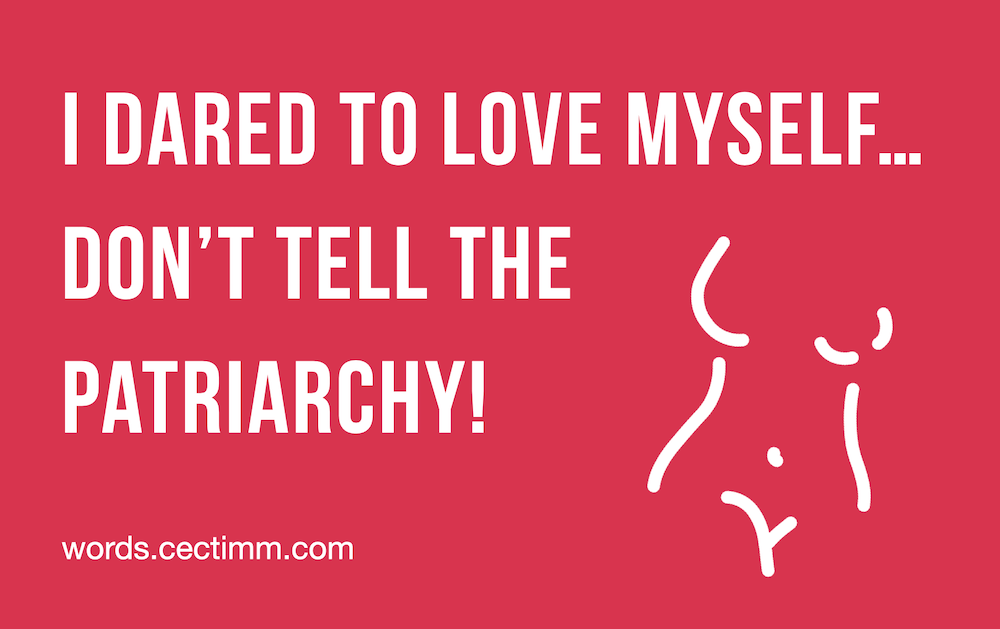
I dared to love myself… don’t tell the patriarchy!
I got in the shower this morning and looked at my body. I took a really good look at it.
 I have to preface this by saying that I did not have my glasses on. I am pretty short-sighted, but I can make out shapes… I don’t see a lot of detail. This might go a long way to explaining the positive experience I am about to tell you about.
I have to preface this by saying that I did not have my glasses on. I am pretty short-sighted, but I can make out shapes… I don’t see a lot of detail. This might go a long way to explaining the positive experience I am about to tell you about.
I checked myself out, and I liked what I saw. I am doing ok. I have never really been delighted with the state of my body for many different reasons. Society – not my mother – has taught me to hate my body, for decades now, I have been told that it is the only appropriate response when confronted with my naked or semi-naked form is hatred. Most of us have been brought up to believe that upon seeing oneself in the mirror, the only appropriate response is disgust (I hope that this is no longer the norm). We are expected to either point out every disgusting flaw in our bodies or better still, avoid looking at our bodies altogether.
I wonder if this standard of self-hatred has been used to manipulate women and keep them “down”. It also makes it difficult for women to embrace their sexuality, something that the patriarchy would like to keep under control. It seems there is nothing more dangerous to the patriarchy than an empowered, free and sexually aware woman.
 This morning I checked out my boobs, they are standing up surprisingly well despite the passage of time. I noticed my nice slender waist and my hippy hips. I also have a pretty substantial butt which I have been reliably informed in en vogue right now. The overall picture was pretty pretty good. Where had my self-hatred and disdain gone?
This morning I checked out my boobs, they are standing up surprisingly well despite the passage of time. I noticed my nice slender waist and my hippy hips. I also have a pretty substantial butt which I have been reliably informed in en vogue right now. The overall picture was pretty pretty good. Where had my self-hatred and disdain gone?
Many women who read this will feel immediately uncomfortable with my profession of self-admiration and will likely criticise or ridicule this as vanity. I can assure you, that is more about their own self-hatred than it has to do with my experience.
I have heard, read and discussed with many women that hitting 40 was a magical thing. It gave them freedom and a lack of caring about stupid things that they wish they had developed a lot earlier in their lives. This freedom has been creeping in for the last few years, and I must say, I like it.
 I have a strange and strained relationship with my body. I have chronic pain. I am crippled by terrible, terrible pain that prevents me from doing many things I enjoy. It has limited my lifestyle dramatically over the last 15 or so years, and for a long time, this made me hate my body on a whole new and deeper level. This hatred and feeling of betrayal has been the hardest to overcome. I have to say that I’m still not entirely over it. My level of distress concerning my body can vary from day to day, depending on how bad my pain is and how limiting it is. But as a whole, I have worked really hard to not hate my body for restricting my life. I have gradually shifted to feeling admiration and awe at my body’s ability to continue to function and thrive(ish) despite my ongoing health issues.
I have a strange and strained relationship with my body. I have chronic pain. I am crippled by terrible, terrible pain that prevents me from doing many things I enjoy. It has limited my lifestyle dramatically over the last 15 or so years, and for a long time, this made me hate my body on a whole new and deeper level. This hatred and feeling of betrayal has been the hardest to overcome. I have to say that I’m still not entirely over it. My level of distress concerning my body can vary from day to day, depending on how bad my pain is and how limiting it is. But as a whole, I have worked really hard to not hate my body for restricting my life. I have gradually shifted to feeling admiration and awe at my body’s ability to continue to function and thrive(ish) despite my ongoing health issues.
According to social norms, that are dictated by a long outdated and no longer relevant patriarchy, I am supposed to look at my body and pick out everything that is wrong with it. I am supposed to hate my breasts, despise my belly, hate my hips, ridicule my legs, mock my arms and loath my face. I am supposed to feel ugly and ridiculous and unworthy of love or praise from anyone, including myself. The spell has been broken. Perhaps it’s age, wisdom, the power of pain or the passage of time. Maybe it was not wearing my glasses, allowing me to see the whole and not focus in on the finer details. Whatever the reason, I was so relieved to feel happiness, pride, admiration and joy when looking at my glorious naked form in the mirror today.
 I recently suggested to a group of women I love, trust and admire that we all try to practice saying nice things in the mirror to ourselves in the morning. I suggested we look at ourselves in the mirror and say “I am a proud woman”. I have noticed many men look at their reflection and see a big gut, stumpy legs, red face and bald head and make metaphorical gun hands at themselves and nod with approval. I am not saying they are not beautiful, but they feel fantastic despite their many many flaws. Women need to learn from their male counterparts when it comes to mirror self-love. The women I spoke to all resisted the idea and said they could not do that. It is so ingrained in our psyches to dislike ourselves that any deviation from that script makes people feel anxious.
I recently suggested to a group of women I love, trust and admire that we all try to practice saying nice things in the mirror to ourselves in the morning. I suggested we look at ourselves in the mirror and say “I am a proud woman”. I have noticed many men look at their reflection and see a big gut, stumpy legs, red face and bald head and make metaphorical gun hands at themselves and nod with approval. I am not saying they are not beautiful, but they feel fantastic despite their many many flaws. Women need to learn from their male counterparts when it comes to mirror self-love. The women I spoke to all resisted the idea and said they could not do that. It is so ingrained in our psyches to dislike ourselves that any deviation from that script makes people feel anxious.
I am not the first women or person to make this discovery. It is happening all the time in mirrors and bathrooms all around the world. Women are waking up to the limits society, and the patriarchy has placed on them. These “rules of engagement” have been holding us back, for decades and centuries.
 In recent years, influencers like Celeste Barber have done great things for body positivity. Celeste might not be Anna Wintour’s idea of ideal beauty, but Celeste’s acceptance of her body – even though it’s through self-deprecating humour – is helping many women accept their own beautiful bodies. It can only lead to more freedom.
In recent years, influencers like Celeste Barber have done great things for body positivity. Celeste might not be Anna Wintour’s idea of ideal beauty, but Celeste’s acceptance of her body – even though it’s through self-deprecating humour – is helping many women accept their own beautiful bodies. It can only lead to more freedom.
Sometimes I am a bad feminist, secretly judging women and girls for fashion choices they make showing off body parts I never would. They seem to possess body confidence that appears to be unjustified by beauty industry standards. When I catch myself in these thoughts, I consciously change them to admiration for accepting their body the way it is, and I wish I too had that strength.
 Looking at yourself in the mirror and liking what you see is not going to bring on equality and smash the patriarchy. Still, it is a small piece in the puzzle leading to women feeling empowered and capable of fighting the good fight. Let’s smash the patriarchy ladies.
Looking at yourself in the mirror and liking what you see is not going to bring on equality and smash the patriarchy. Still, it is a small piece in the puzzle leading to women feeling empowered and capable of fighting the good fight. Let’s smash the patriarchy ladies.
So if you wear glasses, start slow and take them off before you try scanning yourself in the mirror. It might make all the difference. Practice loving yourself and work up to doing the same with your glasses on.
It feels pretty wonderful to love yourself. Do try it.
What are you going to say to yourself the next time you look at yourself in the mirror?

Wear a mask malaka
Wear a mask malaka
Wear a mask Malaka
just put one on your face
this bloody coronavirus
is infecting the human race
Wear a mask malaka
it’s good for you and me
it’s not 100% effective
but it’s easy as 1, 2, 3
Wear a mask malaka
along with cleaning your hands
and keeping social distance
if not life as we knew it, will continue being banned
Wear a mask Malaka
it will help prevent the spread
it’s really not that hard
get it through your stupid head
Please wear a mask malaka
it won’t negatively affect your brain
if you believe conspiracy theories
chances are, you’re already insane
Who will wear a mask malaka?
will you choose to comply?
listen to the facts and science
to this, your freedoms do not apply
I wear a mask malaka
because I don’t want to get sick
we must care for each other
so stop being a massive prick
So grab your mask malaka
when you’re heading out the door
we all want to get back to our busy lives
that we all miss and once adored
Its time to wear a mask malaka
because it’s not just about you
we all have to get on with life
and your bare face is now taboo
Let’s all wear masks malaka
because deep down we all care
about ourselves and each other
and together we can wake up from this nightmare
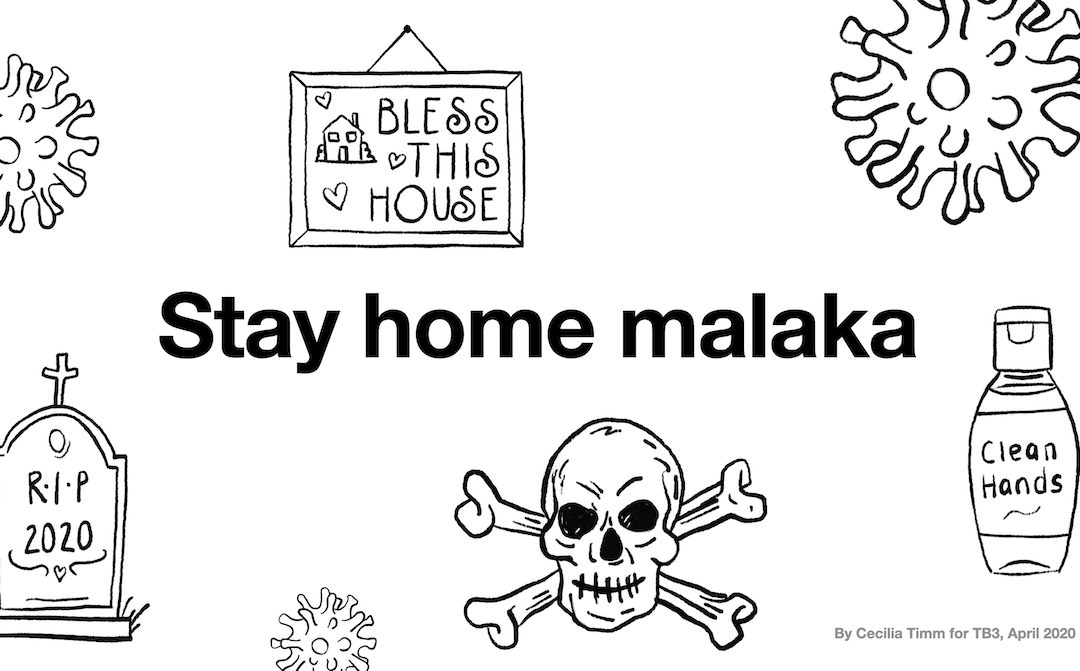
Stay at home malaka
Stay home malaka
In late 2019, a novel virus came to town,
it had a strange name, Corona, and made people sick from all around.
There was no vaccine, no treatment and definitely no cure,
they didn’t know much, but they knew it would endure.
China was the first victim but the virus quickly spread,
to Italy and Spain where so many people started dropping dead.
It made its way through Asia, Europe and the United States,
then the governments cottoned on that they could start by shutting gates.
But there’s nothing we can do?
Stay home malaka.
“We can’t shut down the world”, the global leaders said,
our economy matters more than you, but more people dropped dead.
Countries began to suffer, one fell and then the next,
with so many people getting sick, the leaders were perplexed.
Some countries acted slowly, not believing in this curse,
“So what if people are dying, we’re more concerned about our countries purse.”
But the numbers grew too quickly, and too many people were dying,
mothers, grandfathers, sons and daughters lost loved ones and were left crying.
What do you want us to do?
Stay home malaka.
We quickly became aware that coughing was an issue,
to stop the virus spreading, we were told to cough into a tissue.
Corona was so contagious, unlike many we had seen,
the infected grew quickly, the numbers were obscene.
The world watched on in horror, as the number of dead quickly climbed,
events like concerts, the Olympics and football, suddenly seemed poorly timed.
Countries slowly started acting, shutting down big events,
we started seeing a response from prime ministers and presidents.
What are they going to do?
Stay home malaka.
Some leaders responded better than others, but some put the economy first,
with some not caring about peoples lives, they were stupid and perverse.
Some leaders jumped into action, shutting businesses and schools,
they valued lives more than money, making greedy counties look like fools.
With no cure or vaccine on the horizon, there was only one thing we could do,
don’t touch anything at all and wash your hands like you’ve just done a big poo.
Don’t stand close to people, don’t touch your nose, your mouth or your eyes,
wear gloves and use hand sanitiser, as you cant’s see the virus, due to its small size.
The scientist knew what to do.
Stay home malaka.
It’s time to stay home, study and work from there, if you can,
it’s time to hang out in your bedroom, lounge and garden with the fam.
It’s time to cook food from scratch and learn to make your own martinis,
and watch everything on Netflix, YouTube and Stan, on all our little screenies.
Stay in touch with friends, colleagues & family with FaceTime, Zoom & Teams,
we can’t go outside, but we can see the world through our screens.
Do puzzles, crosswords or read a book, do everything you can indoors,
clean your kitchen, bathroom, lounge & garage, sort out all of your draws.
There is plenty for us to do.
Stay home malaka.
It’s important to know it’s ok, for you to have a bad day,
to miss your old life, your friends, your work and your bae.
Do your best to stay positive and work on coping skills,
and if you need to get away, don’t go out, just Netflix and chill.
We don’t know when this will all be over but it’s important to stay inside,
we need to listen the experts and let science be our guide.
Every country is responding in its own way, and with it’s own plan,
but we’re all responsible for our own actions and our own life plan.
We all know what we should do.
Stay home malaka.
Though the uncertainty is torturous, it’s better than getting sick,
it can be challenging to stay at home, but don’t go out and be a dick.
We are living through a crazy and unprecedented time,
but for now we can create many moments that are fun and sublime.
We can focus on what we are lucky enough to possess,
we may not be rich like Besos, but we have enough to know we’re blessed.
Times will sometimes get tough and we may get fed up with our loved ones,
but we are grateful that in Australia, we don’t have ready access to guns.
God I need a break from being in the house.
Stay home malaka.
So the take away is clear, it’s time to stay at home,
it’s what’s best for everyone so don’t go out and roam.
There will be good and bad days and it may feel like its never ending,
but rest assured that staying in, in 2020, is the top thing that will be trending.
We’re all in this together, and form this we will emerge,
with new skills, new hobbies and hairstyles with our sanity on the verge.
One day Coronavirus will go away, and society will become a new,
but we will forever be very wary of anyone who goes “achoo”.
We will ALL stay at home.
Stay home malaka.
Greta, you speak for me
@GretaThunberg
Greta, you speak for me, all of humanity and the planet. I am mortified that the Australian government is so lacking when it comes to understanding and action on climate change. I can only hope that the continued pressure you, your generation, my generation and every single person you have mobilised will continue to recruit and march until our governments have no choice but to change. Eternal economic growth is not possible. In our bodies, eternal growth is cancer, and the desire for eternal economic growth is the cancer that is killing our planet. We need to take economic action to force our greedy leaders to act – its the only language they understand. Keep speaking up and remember for every person who attacks you; thousands support you. You are speaking the truth, and that is why they are so scared of you. Keep fighting Greta, and I will keep fighting with you. You go girl!
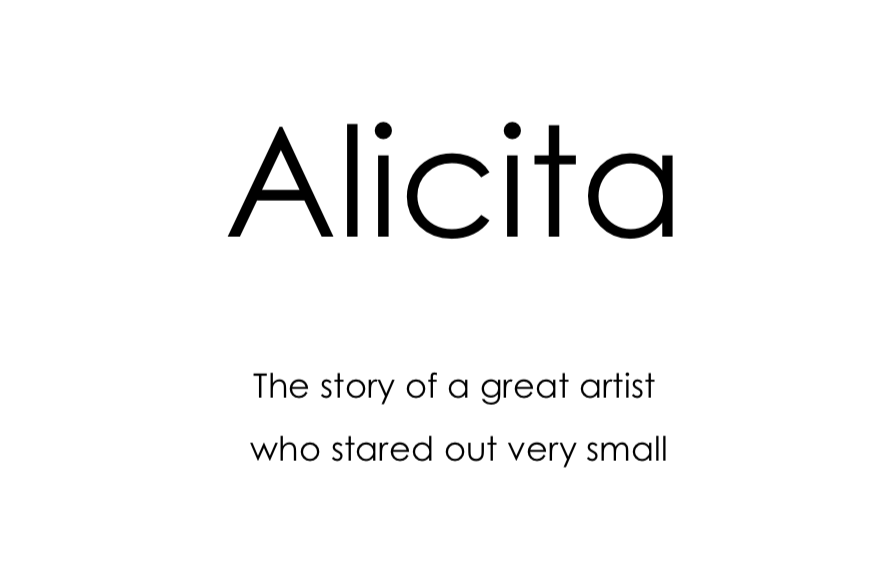
Alicita: The story of a great artist who started out very small
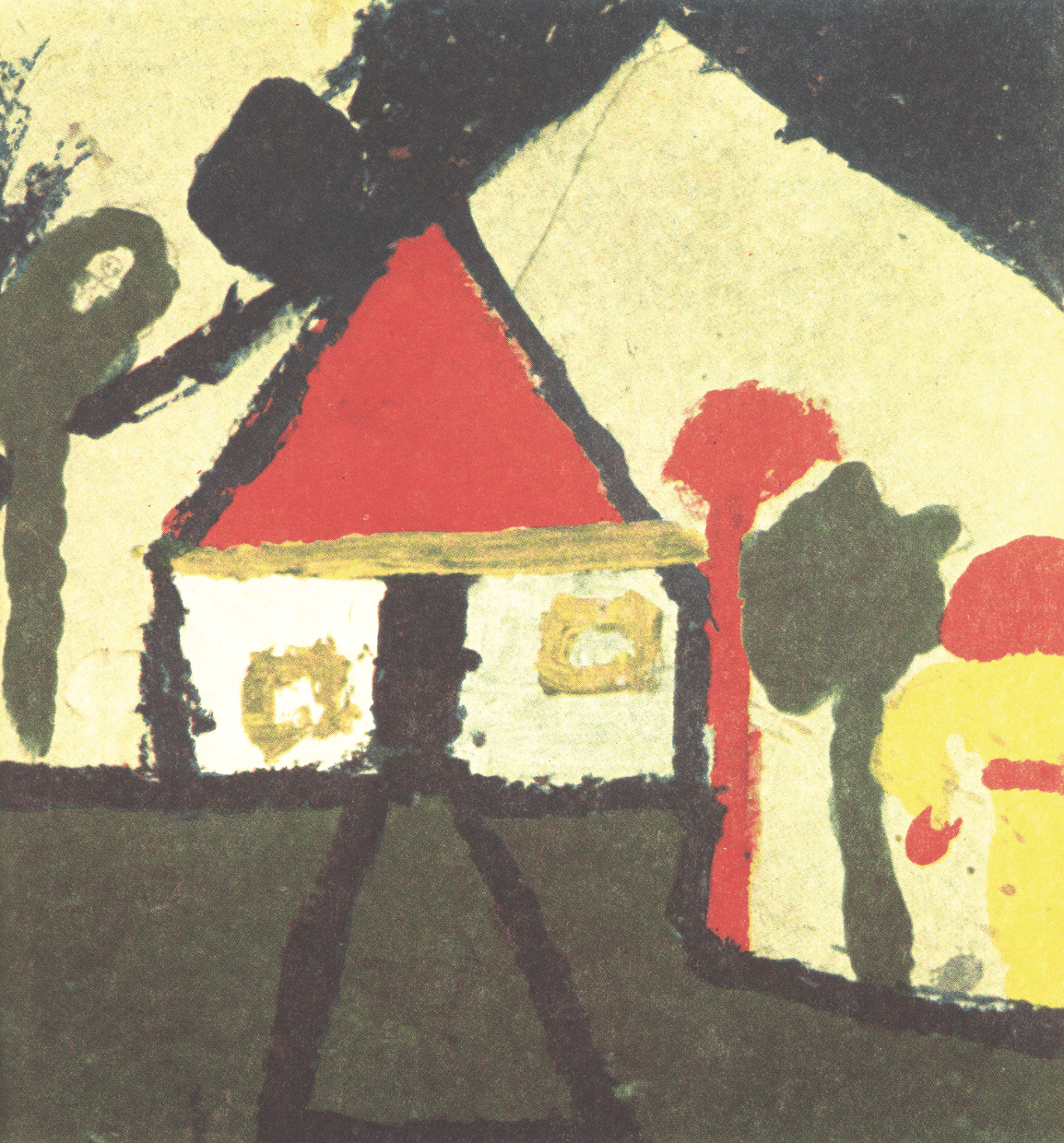
The winning painting by Alicita age 6.
written with love by Cecilia Timm
Alicita
They were so shiny and delicious, a rainbow of colours that would entice any imagination. She wanted them so much. Alicita looked up at her mum and pointed to the wooden box of pencils she wanted. Most six-year-old girls would be happy to stare longingly into a candy store window but Alicita was more excited here, this was her Mecca.
Alicita was special, not because of her blond curls and blue eyes (rare in Santiago, Chile), and not because she was the last happy accident, in a large loving family of 5 children. Alicita was a talented artist, even back then. Her creative spirit had been nurtured and cultivated from the beginning.
Nenna was the eldest and the first grandchild of her generation. She was spoilt by her grandparents and soon learnt to use manipulation as her weapon of choice.
Second in line was George, the only son of the family. He was a charming and charismatic boy with movie star good looks. He was kind, loving and was always looking out for his sisters.
The third to arrive was Carmińa. She was a beautiful, artistic and caring girl, who loved to learn, as much as she could about the arts. At a young age, she became sick, when doctors misdiagnosed a heart condition. She became gravely ill and spent the rest of her short life between periods of relative health and near death.
Meche (Mercedes) was the fourth to join the family. Her nickname was Negrita, as she was painted with a darker brush, with beautiful olive skin. She was the rebellious, cheeky one of the girls and would always seek adventure and trouble.
Finally, Alicita arrived, the baby of the family. She was quiet and chose to sit back and watch her sibling’s adventures, learning from their mistakes. She decided to be a good girl and did not want to rebel against her parents, school or society. She was a quiet observer.
Having the good fortune of being born into a wealthy family, life in Chile was good and none of the children in the family wanted for anything. The best schools, beautiful clothes, housekeepers and nannies were a part of everyday life. Unlike other Latin American families, the girls were not treated with much difference from their brother. The largest difference being of expectation. Being the only boy, George carried the responsibilities of his father’s dreams for his career. The girls were encouraged to learn, achieve and inspire themselves and others. Perhaps their father’s business links with America opened his eyes to a new way of seeing women as he showered his wife with adoration and respect.
Alicita was influenced by all of her siblings, but perhaps most by Carmińa. Carmińa could not be left on her own, for fear she would become ill and that no one would be there to get help. Her quiet life led to her interest in the arts: drawing, writing and painting. She would send away for correspondence courses in drawing and spent hours practising at home. She was very talented. When she was well she would paint in the park, go to the art gallery and sketch for hours as well as write stories and poetry for her family. Alicia would often accompany Carmińa but would get bored at the art gallery, as she would have to wait for hours. She walked the gallery halls, looking at the walls, not knowing the influence they would have on her later in life. She did not know that she had the makings of a great artist.
One day at school, an announcement was made about a competition to select a painting that would represent the children of Chile, for the Hans Christian Andersen International Union for Children Welfare. This organisation wanted to collect one picture from each of 48 countries to make up a travelling exhibition, to raise global awareness of children in need around the world. Alicia was excited about the competition and was counting down the days.
Standing at the art shop window with her mother Alicita was dreaming of the pictures she could draw with the beautiful box of pencils. Her mother could see her desire and promised to get her the box of pencils if she won the drawing competition. Alicita was elated, she was so excited now, and could hardly wait.
The days passed slowly and when the competition day finally arrived, hundreds of students from all over Santiago filled a large hall. It was not until much later in life that she became accustomed to the rows of desks and quiet of exam halls. Each desk was set up with the same equipment; paper, paints and brushes. It was all so serious. There was no favouritism, no chance of getting help with drawings and no noise. “Your time starts now”. The only noise that could be heard was that of moving paper, the occasional cough or shuffling of chairs. The scene was very foreign for Alicita, it was so large and cold, but soon enough the room disappeared, as she picked up her brush and started to paint.
Alicita loved to paint. She chose to paint her house as it was familiar to her. A wide welcoming path made it’s way across the front garden, leading to the front door of her house with two windows on the front. The Andes Mountains rose up in the background as these could be seen from most places in the city, the sky was filled with stars (an image now extinct in Santiago) and her mother stood in the front garden in a yellow outfit.
She had forgotten where she was and as she put down her brush she remembered the competition. Looking around the hall she could see the officials (a group of two men and a woman) walking around the room, looking at all of the artworks on their tiny desks. They circled the room once and then again. On their third time around the room, they stood near Alicita’s desk, speaking seriously and quietly. The lady from the group came up to Alicita’s desk and snatched the picture. She held it above her head and announced: “this is the winner”. The group of officials scattered off with the painting, but one man stayed behind to tell her that a certificate would be sent to her.
Alicita Never saw that picture again.
It was a strange victory. In one way she was elated to have won such a large competition but she also wished she’d had the picture to show the family her masterpiece. This was her first experience of winning and she was not sure what to make of it.
On returning home that day, Alicita was the centre of attention. Everyone wanted to hear her tell the story of how she had been the best child painter in Santiago on that day. She described the painting in vivid detail; every brush stroke came to life as her family asked her to tell the story again and again. That night Alicita was exhausted from her exciting day and dreamt of the house in her painting.
The excitement was short-lived as Carmińa became gravely ill again and a shadow of fear, uncertainty and urgency fell over the house. Alicita’s win was forgotten, as was the box of pencils.
Despite her young years, Alicita understood the seriousness of her sister’s illness and the strain it brought on the entire family, especially on her mother. Despite this, she was still disappointed that her mother had forgotten her promise.
Carmińa was no longer in immediate danger of dying and for a while, Alicita thought her mother might still remember and arrive home one day with the pencils as a surprise, but this never happened. Alicita continued to accompany her sister to galleries, art markets, the park and museums. They would both practice their craft but when Carmińa died Alicita continued to paint and draw on her own. A few of Carmińa’s paintings and poems continued to inspire Alicita to continue her adventures into art.
Alicita grew up to be a beautiful, intelligent and artistic woman. She married at the ripe age of 21 and started a family of her own in Santiago. She then moved to Sydney Australia and continued to bring up her family in a new world. Her art followed her wherever she went and it grew as she did into a beautiful collage of light, love and dreams.
Cecilita
Cecilita was the only skippy in a family of wogs. Her parents migrated to Australia from Chile two years before she was born. Her eldest sister Carolina (Clota) was born in Santiago and was five years her senior. Clota felt very protective of Ceci from the time she was born. Carolina had a life-size doll that she would care for as her own baby, in the same way, her mother did with Ceci. This caring continued and later in life, Carolina always kept an eye on the baby of the house.
Cecilita’s mother had decided to start a new life in Sydney, Australia to give her children the best chance to grow up in a place that would allow them to grow up with the finest possible schooling, opportunities and attitudes.
The girls were always encouraged to explore every aspect of themselves from art and science to sport and music. Both girls were curious and clever, adventuring into projects, clubs and making fun around the house. One day Ceci came across a certificate that was made out to her Mum, it was from The Hans Christian Andersen International Union for Children’s Welfare. Ceci asked her Mum what it was for and she explained that when she was a small girl, not unlike her daughter, she had been interested in the arts. As a girl, Cecilia’s Mum, Alicita knew of an upcoming painting competition, her mother promised to buy her a box of pencils she really wanted but forgot to get them for her when she won the competition.
This story made Ceci sad and she promised herself that one day she would make up for that promise.
This certificate fascinated Ceci as it showed her that one day long ago, her mummy had been a little girl too. This was something she had never really thought of before.
Many years later, when the girls had both grown up, Ceci found that same certificate again and decided to keep it – not to take it from her mother but to help her try to find the picture her mother could barely remember.
Alicia had become a fantastic painter in her adult life and Cecilia thought it could be fun to find the painting that had won such acclaim. In January of 2000, Cecilia started researching the Hans Christian Andersen International Union for Children’s Welfare, attempting to contact them via their website but to no avail. Her emails were ignored. She tried to contact charities associated with Hans Christian Andersen, searched online bookshops, and emailed anyone whom she thought might help.
From time to time Cecilia would try to search again and one day in January of 2003, she found a listing for a Hans Christian Andersen book printed in 1958. It was a collection of stories and was listed as being illustrated, with the drawings of children from around the world.
So many of these searches had ended in disappointment, but Cecilia decided to send an email asking the book’s owner to see if there was a picture drawn by a 6-year-old child from Chile. Four agonising days later, a lady called Laura sent a return email saying that the book she was selling had a picture of that description, but did not list the name of the artist, it just said “Chile, 6 years old”. This had to be it, as the dates were perfect. Cecilia was so excited and could not believe her luck. Laura was kind enough to send through a picture of the artwork printed on page 208 and it fit the description her mother had given her so many years before.
Cecilia bought the book over the Internet and had it delivered to a friend’s house to make sure her mother would not accidentally open the package and spoil the surprise. In the coming months, the book arrived, and Cecilia had the certificate and a picture of the painting framed. She also searched for the most beautiful box of pencils she could find, to fulfil her grandmother’s promise.
Even though Cecilia only had one memory of her grandma, they were close. Cecilia always felt her presence wherever she was, even when she was alone. It was not until she was much older than she realised her grandma was her guardian angel. Over the years she had often thought of her grandma and what she would think of the three of them (Alicia, Carolina and Cecilia) living in Sydney, sharing their lives and enjoying the freedoms that come with being a woman at this time in history. Cecilia could only conclude that her grandmother approved, as she had always found a way to look after the three women and make sure they stay together as they are at their strongest this way.
It is now Alicia’s birthday, she is 58 today. It has been 52 years since she first won acclaim for her art. She is now winning acclaim from anyone who happens to see one of her beautiful paintings. Her talent, beauty and passion are obvious to anyone who takes the time to notice. She is very loved by two daughters who think the world of her and admire her strength, intuition & intelligence and hope to one day grow up to be such a woman.
Mum,
I hope you like your book. It was obvious back then that you are talented and that your work should be published and shared with the world. Keep painting – don’t ever stop. You have so much beauty to share.
The story continues from here and the next page is left blank to fill in the future.
Love
Ceci
